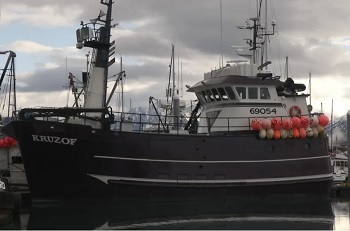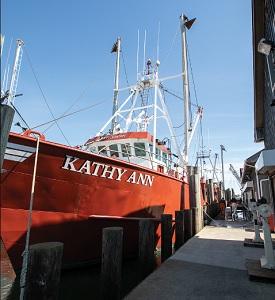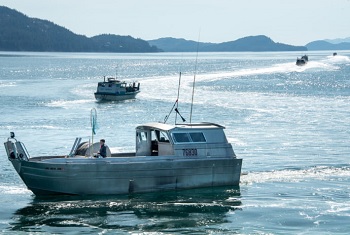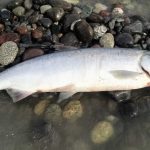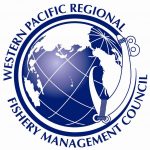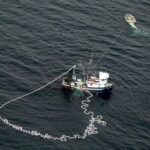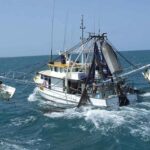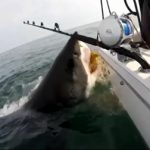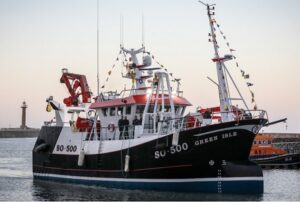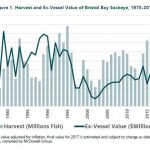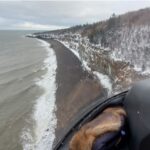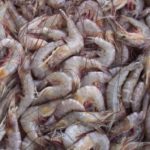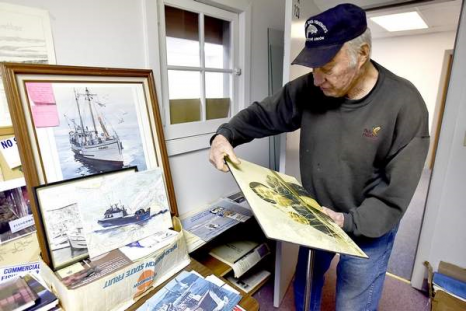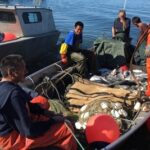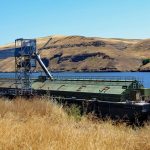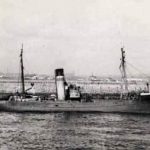Tag Archives: Coronavirus
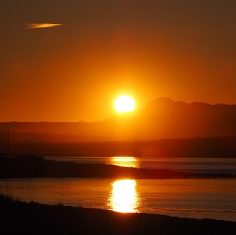
Provincetown’s Blessing of Fleet to be private event in response to Coronavirus
“The Festival, the Pier Corporation, Harbormaster, Fishermen and St. Peter’s parish are working together to arrange a psalm private blessing of the boats,” festival organizers said in a statement. The change was in response to the coronavirus pandemic, and the bishop of the Fall River Diocese likely will be on the water in a boat to give the blessing. There won’t be the big party that people are used to, MacMillan Pier manager Doug Boulanger said. “There’ll be nothing really to see,” he said. This quiet period is a good opportunity to pause and honor the past and remember the crews lost at sea, as well as pray for safe voyages of the town’s commercial fishing fleet. >click to read< 09:16
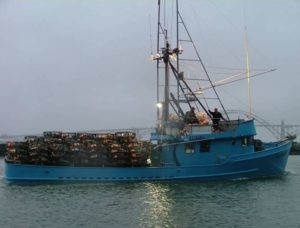
Oregon Fishing Industry Tells Lawmakers Of Economic Hardships – Murkowski pushes for an another Billion in federal fisheries relief funds
The coronavirus has hit Oregon’s commercial fishing industry hard. That was the message to state lawmakers during a recent meeting of the House Interim Committee on Natural Resources. Anthony Dal Ponte is with Pacific Seafood, which is based in Clackamas and has several facilities on the Oregon coast. He said the company had to lay off more than 500 employees after their restaurant and hospitality industry markets dried up virtually overnight. >click to read< Meanwhile, Murkowski pushes for an additional $1 billion in federal fisheries relief funds – Additional money could 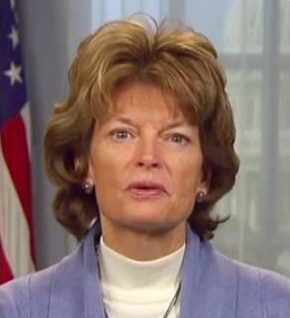 be on the way for the fishing industry. Senator Lisa Murkowski said that she is working to add more fisheries funding in the next round of pandemic relief legislation. “As we think about the impact to our fisheries, $50 million is not going to be sufficient to address the need,” she said. “I have been working with colleagues to urge us in this next round of relief to include $1 billion in fishery assistance funds.” >click to read< 15:07
be on the way for the fishing industry. Senator Lisa Murkowski said that she is working to add more fisheries funding in the next round of pandemic relief legislation. “As we think about the impact to our fisheries, $50 million is not going to be sufficient to address the need,” she said. “I have been working with colleagues to urge us in this next round of relief to include $1 billion in fishery assistance funds.” >click to read< 15:07
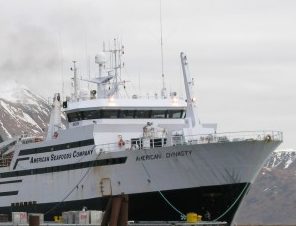
UPDATED: 86 crew members of F/V American Dynasty test positive for Coronavirus
Eighty-six crew members of the American Dynasty trawler that docked in Bellingham last week have tested positive for COVID-19, according to operator American Seafoods in a press release Sunday evening, May 31. Nine tests are still outstanding. The Seattle-based crew are not showing symptoms of the disease and stayed on the ship when it was in Bellingham, according to American Seafoods. The American Dynasty has returned to the Port of Seattle and is under quarantine, the press release said. >click to read< 07:22

Trawler docked in Bellingham testing 100-plus crew for Coronavirus after 1 hospitalized
More than 100 crew members of the American Dynasty trawler docked in Bellingham are being tested for COVID-19, a ship spokesperson said Saturday, May 30. One crew member from the American Seafoods fishing vessel tested positive for the new coronavirus and was admitted to St. Joseph hospital Friday, May 29, for treatment, according to a Friday evening news release from Whatcom Unified Command. The ship docked in Bellingham Thursday, May 26, according to unified command, the multi-governmental agency that’s directing local new coronavirus pandemic response. >click to read< 17:18
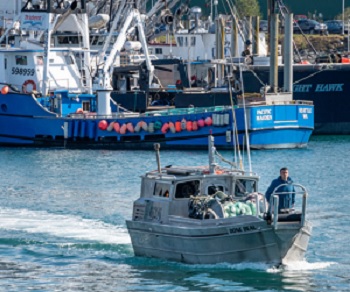
Third time was the charm
Light winds, fog and rain spread over Prince William Sound on the eve of a 12-hour Memorial Day fishery, then turned overcast during the holiday, as the commercial fishing crews netted some 1,467 Chinook and 33,752 sockeye salmon. The catch boosted the total harvest to date to an estimated 45,537 fish, including 4,935 kings and 39,823 red salmon, well over five times the individual catches on May 14 and May 18. The first two 12-hour openers were so slow that the Alaska Department of Fish and Game cancelled fishing for the third opener on May 21. Now the fishery appears to be picking up speed. “It’s still not good,” said veteran harvester Jerry McCune,“We’re getting further behind every day. Hopefully things will pick up in June.” >click to read< 17:15
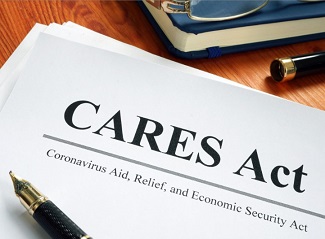
Commercial Fisheries and Fishermen Can Apply for CARES Relief But Not Yet
On May 7, the Secretary of Commerce announced the allocation of $300 million in fisheries assistance funding provided to states, tribes, and territories with coastal and marine fishery participants who have been negatively affected by COVID-19. As a next step, the National Oceanographic and Atmospheric Administration will use these allocations to make awards to its partners – the interstate marine fisheries commissions, Puerto Rico, and the U.S. Virgin Islands – to disburse funds to address direct or indirect fishery-related losses as well as subsistence, cultural or ceremonial impacts related to COVID-19. But relief may take some time. No funds have yet been made available to the Atlantic States Marine Fisheries Commission or states. The N.J. Department of Environmental Protection staff is working diligently to develop a spending plan and application process that must be approved by NOAA. >click to read< 11:07
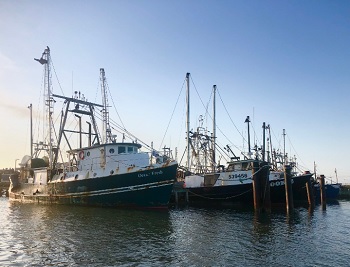
Fishermen Finding Windows Of Opportunity, Necessity Opened By Coronavirus
“Guys are getting creative,” said Edward Warner Jr., a commercial bayman from Hampton Bays. “You have some guys going on the internet and selling and going to the green markets in the city more. Different people are trying different things to make few bucks here and there.” Before the epidemic, the majority of fish landed by local boats was simply packed in waxed cardboard boxes, topped with crushed ice and trucked into New York City’s central seafood market in Hunts Point, Brooklyn.,,, In mid-March, when restaurants and thousands of other businesses were ordered to close, and people scrambled to pack into their homes and venture out as little as possible, prices for fish cratered. >click to read< 12:25
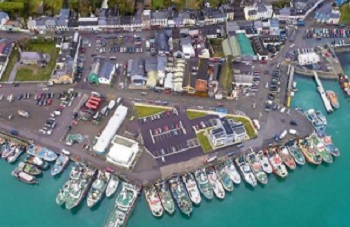
“Minister Michael Creed and his officials have effectively turned their backs on the fishing industry.”
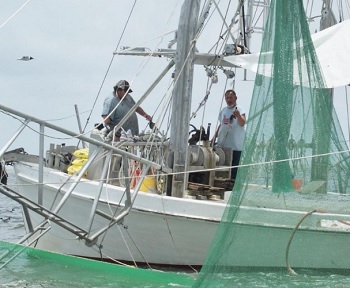
Alabama: Shrimpers having tough spring season
The COVID-19 global pandemic has caused the price of shrimp paid to fishermen to plummet, causing many to stay home. Those who are on the water say they are not having much luck finding shrimp. The season began on Monday, May 18, and only a sparse number of boats can be seen dotting the waters. Dock operators and shrimpers say COVID-19 caused restaurants to sell few shrimp, and this has meant processors haven’t moved much product. The low demand for new shrimp has dropped the normal $1.85 per pound for larger shrimp down to $1.05. Smaller shrimp, normally fetching near a dollar per pound, has dropped below $.50. Morris Liner, a shrimper of 42 years, said that the windfall that the lower oil prices could have brought has not materialized. >click to read< 11:14
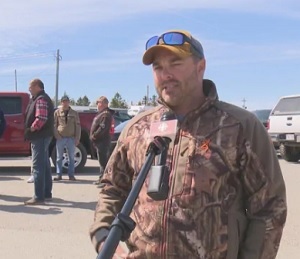
Process local lobster first, say Val Comeau fishermen after devastating processing plant fire
Steve Ferguson said he wonders what will happen next as they wait to see if the buyer they deal with at Les Pêcheries de Chez-Nous factory will be able to help them out. While a large part of the plant was destroyed in a fire, a portion of the processing plant not damaged is set to resume processing lobster this week with about a third of the staff. The company said 331 people were working at the plant at the time of the fire, and 100 lobster fishermen sold their catch to the plant. Local fishermen want to make sure their catch will take priority over lobster being brought in from Nova Scotia and Prince Edward Island. “At the end of the day, if they can’t produce our lobster from here, why are they bringing so much from other provinces. >click to read< 15:15
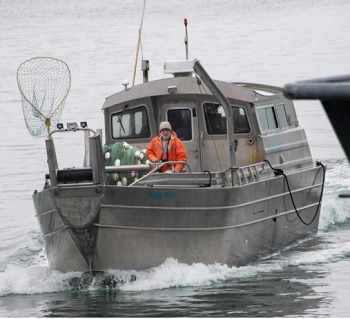
NPFMC meets online to resolve halibut issues
Federal fisheries managers met online in mid-May to approve emergency action necessitated by the impact of the novel coronavirus,, The session, announced in late April, allowed for harvests, processors and other fishing industry entities until one day in advance of the May 15 meeting to submit written comments through links on the North Pacific Fishery Management Council’s agenda on five emergency requests. Those requests ranged from allowing all holders of individual fishing quota to make temporary transfers of that quota to eligible hired masters during the pandemic to increasing IFQ end-of-year rollover provisions. The council approved the transfer for the rest of the 2020 season for quota shares owned by all halibut and sablefish IFQ holders, based on a request from 11 industry leaders. The council also recommended to the International Pacific Halibut Commission, a request from the halibut charter industry,,,>click to read< 18:34
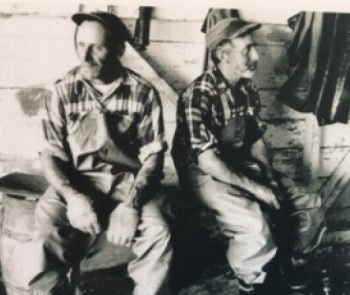
‘A drink and a good yarn’: Neils Harbour man reveals the secrets to a life well lived, as he turns 100
Ron Ingram of Neils Harbour will celebrate a love of hard work, a life at sea and the occasional ‘nip of rum’ when he celebrates his 100th birthday later this month. It won’t be quite the celebration he’d hoped for. Ingram’s family had planned an open house. Ingram, who still lives on his own, was hoping people could drop by. Those visits from friends are what he misses most during the COVID-19 pandemic. Ingram moved to Neils Harbour, a small fishing village in northern Cape Breton, about 75 years ago. Born and raised in Grand Bruit, N.L., he started fishing when he was nine, according to daughter Kathy MacKinnon. He moved to North Sydney at 18. Newfoundland was part of the British Empire then, he said, and he had no choice but to continue fishing. photos, >click to read< and Happy Birthday, Ron Ingram!
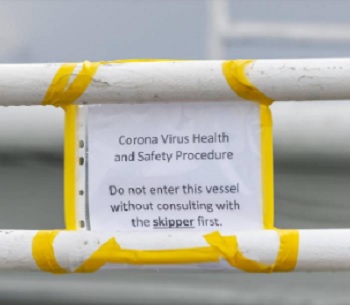
Ireland: Warning fishing industry is on brink of collapse due to lack of Coronavirus support
Ireland’s €1.2 billion fishing industry is on the brink of collapse, according to industry representatives who say it has been decimated by the collapse in domestic and EU markets since the start of the Covid-19 crisis. But they also say the government’s lack of appropriate help could prove to be the final nail in the coffin. The representatives point to the fact that Agriculture Minister Michael Creed recently announced more money for harbour repairs than for packages to help fishermen and women. They also say a scheme he announced last week to help pay the costs of boats that can’t fish because of the crisis is “not fit for purpose”. >click to read< 10:25
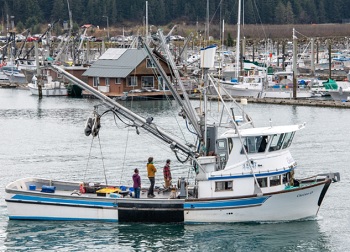
Still slow going for Copper River opener, remains closed at least through Monday, May 25
Opening harvests of the 2020 Copper River commercial fishery, complicated by effort to keep the COVID-19 pandemic at bay, got off to a slow start for the first two 12-hour openers. The overall catch of Chinook and sockeye salmon came in way below forecast. The first two 12-hour periods brought processors an estimated 6,025 sockeyes and 3,255 king salmon, Copper River commercial fishery biologists said. The 372 deliveries from the first opener on May 14 included just 1,473 sockeyes and 1,552 Chinooks. Then on May 18, there were 412 deliveries, with 4,552 sockeyes and 1,703 Chinooks. The projected harvest for the second period alone had included 28,590 reds. >click to read< 16:16
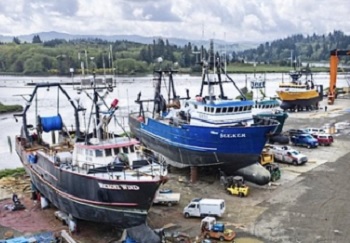
Something Big is in the works at the Port of Toledo’s Shipyard, Repair work continues, unabated!
JH Kelly ironworker crews are close to half way through the job of constructing the port’s towering new work building. When completed later this year this year the $5.1 million, 90-foot tall structure will provide the yard with a contained, all weather environment to conduct painting, sandblasting, welding, and other work. Repair work at the Toledo yard has continued unabated despite the ongoing national health crisis and its impact on the larger economy. >click to read< 14:17
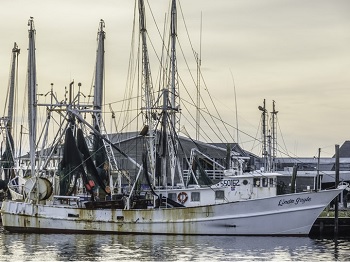
For troubled Outer Banks commercial fishing industry, Coronavirus is one more blow. Louisiana, too.
At the state and federal level, increasing regulatory requirements and catch quotas, fueled in part by aggressive lobbying of elected officials by the well-funded recreational fishing industry, have caused even more commercial fishermen to leave the industry. And now COVID-19 strikes another blow to the solar plexus of an industry that, no pun intended, can barely keep its collective heads above water. And interviews with two local operations — of distinctly different sizes — help shed light on how the COVID crisis has affected the Outer Banks’ commercial fisheries. Mark Vrablic of the Willie R Etheridge Seafood Company, one of the last remaining large-scale seafood distributors in Wanchese, minced no words when he described the losses created by the worldwide pandemic. >click to read< 19:15
Shrimp industry in Louisiana hit hard by Coronavirus pandemic – Shrimp processors are shut down and the baskets that are usually filled are empty. Brown shrimp season started on Monday, and so far it hasn’t been good. “Absolutely terrible, last year I had 42 boats going out during brown shrimp season, this year I only have 9 boats,” said Craig Napoli, C&A Seafood. >click to read<
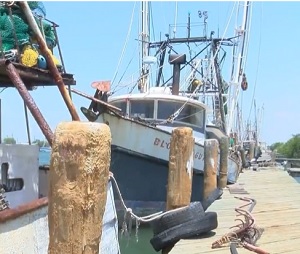
Brownsville: How Coronavirus pandemic is affecting shrimp producers
About two months ago, one of Andrea Hance’s boats came in with about 10,000 pounds of shrimp. Hance said on average the price of shrimp that they get from the boat is about $5, but buyers were not willing to pay that much. “They were coming back after they told us that they were not going to bid at all, you pressure them a little bit and then they said well we’ll give you a bid, but you’re not going to like it,” said Hance. “Well we ended up selling our shrimp for $3 a pound so we lost quite a bit of money on the last trip.” These are prices that John Keil Burnell, who is one of the owners of Shrimp Outlet in Brownsville, is seeing. Video, >click to read< 16:16
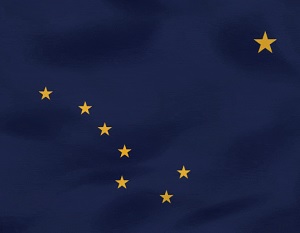
‘We’re open’: Alaska businesses can operate at full capacity Friday, Dunleavy says
Alaska businesses can open at full capacity on Friday and sports can resume, Gov. Mike Dunleavy announced Tuesday evening. “Friday, we’re open for business across the state of Alaska,” Dunleavy said at a news conference. Alaska will enter phase three and four of the government’s five-phase reopening plan at 8 a.m. Friday. That means restaurants, bars, gyms and other businesses can fully open. All churches, libraries and museums can too. Sports and recreational activities can resume, Dunleavy said. It’s the governor’s latest major lift of coronavirus-related restrictions. Previously, certain businesses could only operate at 25% to 50% capacity. “It’ll all be open, just like it was prior to the virus,” Dunleavy said. >click to read< 10:29
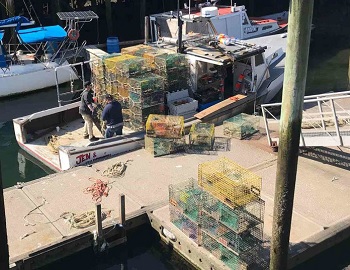
The Lunacy of Global Seafood Supply Chains
Like all global supply chains right now, this one feels unstable and unsustainable. Most of the seafood we eat in America, even in Gloucester, the country’s oldest seaport, comes from overseas. Most of what local fishermen catch is sent elsewhere. “The models aren’t designed to feed local and regional markets,” Tolley says. Those famous fish sticks bearing the logo of a Gloucester fisherman? By the time they reach your frozen foods section, they’ve made an exhausting global journey, exported for processing, then reimported. Nearly 500 commercial boats fished out of Gloucester a decade ago. Today, there are two dozen. This reflects both the decades-long collapse in groundfish stocks—the cod and haddock that once abounded in the cold waters off Cape Ann—and ever-more-aggressive federal measures limiting who can fish and for how much. >click to read< 09:07
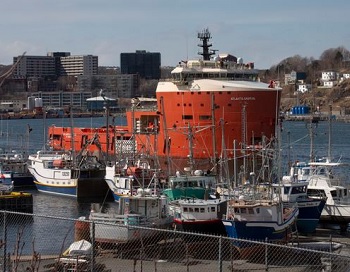
Economic storm brews over Newfoundland and Labrador
Crab season in this part of Newfoundland and Labrador normally starts at the end of April and has always marked the beginning of the fishing calendar in a place where work is still tied to the bounty of the sea. But now that their crab pots are in the water, the crews aren’t sure if they can collect them. The pandemic has cut the price of crab in half, and fishermen are worried about confrontations at the wharf with larger boat operators who can’t afford to go to sea with such deflated prices. “It looks like when someone has died and you’re just waiting around to see what’s going to happen. As oil prices have collapsed, so have revenues from key industries such as tourism, forestry, mining and the fishery because of the continuing COVID-19 fallout. Personal income and sales tax streams have shriveled. The pandemic also shut down megaprojects such as the Voisey’s Bay mine and the Muskrat Falls hydroelectric dam, and closed the province’s only oil refinery. Future offshore projects, including the $6.8-billion deep-water Bay du Nord oil field, have been put on hold. >click to read< 14:58
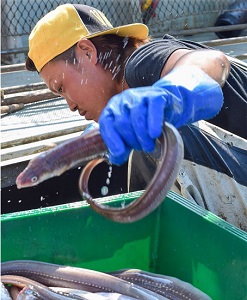
Japan: A Fisherman in the Time of the Coronavirus
This coronavirus is unbelievable. Nobody’s catching any fish in Japan, but even so, they’re selling for next to nothing. I’m a fisherman from a village in Miyagi Prefecture. Every day you hear reports that Japan’s “entering a crucial stage in the fight against COVID-19.” It’s the same for the fishing industry. Of course, we’re taking the same actions as everyone else against the coronavirus, but we have our own problems too: meager hauls and plummeting fish prices. I make all sorts of seasonal catches through the year—mainly autumn chum salmon, but also conger eels, Pacific cod, red sea bream, olive flounders, sea squirts, Kinka mackerel, Spanish mackerel, common octopuses, giant Pacific octopuses, crabs . . . in fact, so many I can’t write them all down. These are really fertile fishing grounds. Or maybe I should say they were really fertile fishing grounds. >click to read< 09:37
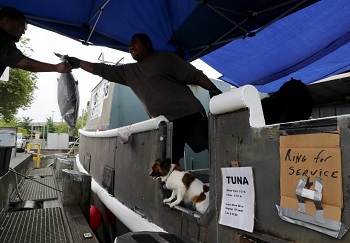
‘Baboom!’ St. Jude returns with 48 tons of tuna and no restaurant market thanks to coronavirus so they are selling it at Seattle’s docks
When the tuna boat St. Jude motored out of Anacortes in November for fishing grounds 5,000 miles away in the South Pacific, few people outside of microbiology labs had ever heard the word “coronavirus.” By the time the 95-foot vessel docked in Seattle this month, the microbe had shaken the entire world and turned the seafood business upside down. “Baboom!” said owner and captain Joe Malley, who returned from the six-month voyage to find the primary market for his high-quality albacore had vanished. “Who could have anticipated this?” >click to read< 11:19
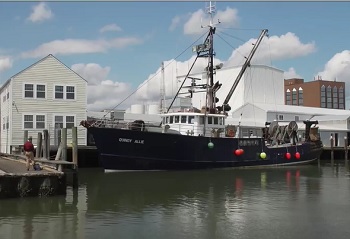
‘I Don’t Know if We Will Make It’: Fishing Industry Takes a Huge Hit from Coronavirus
Commercial fishing is one of the many industries suffering from the impact of the COVID-19 pandemic. It’s led to a dramatically shrinking market for seafood as restaurants either close or have converted to takeout, and consumers stay home. It’s a quiet scene these days at L.D. Amory & Co. in Hampton, Va. The normally bustling wholesale seafood packer is struggling. “About 80 percent of the product we pack here ends up in restaurants,” Meade Amory, vice president of the company, told CBN News. “And so far we have no markets for our products right now, and it’s been very difficult.” Video, >click to read< 10:34
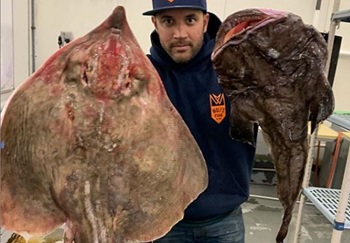
The future of fish is frozen: How the Massachusetts seafood industry is adapting to Coronavirus
As restaurants closed, local seafood distributors needed to find a way to sell their product. So they turned to their freezer. Jared Auerbach first saw the effects of the coronavirus pandemic in early January, when seafood orders from Boston’s Chinatown — and Chinatowns across the country — slowly stopped coming in. At first, the founder of Red’s Best, a Boston-based seafood distributor, wasn’t too worried. “The second week of March, we were down about 20 percent,” On March 17, restaurants in Mass. were ordered to shutdown, and Auerbach, who founded Red’s Best in 2008, saw his business fall out from under him “What’s our contingency plan?” Across the country, seafood purveyors are all asking the same question. >click to read< 13:25
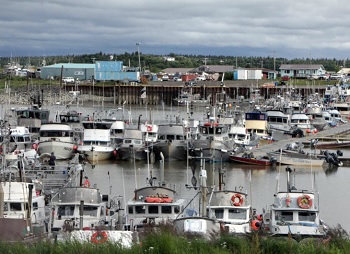
Trident seafood worker the first positive COVID-19 case in Dillingham
Dillingham has its first case of COVID-19. According to state data, the person is an out-of-state resident who works in the seafood industry. It’s the ninth case of an out-of-state resident testing positive for the disease, and it’s the fourth instance of someone testing positive who works in that industry. The state said in a news release that the individual is a seasonal worker for Trident Seafoods. Trident is arranging for that worker to leave the community today. That person is doing well and does not require hospitalization. Public health nurses have completed a contact investigation and report that no one at that quarantine site had any outside contacts. “They haven’t exposed the community because they haven’t been out in the community,” public health nurse Gina Carpenter said in the state’s news release. >click to read< 18:51
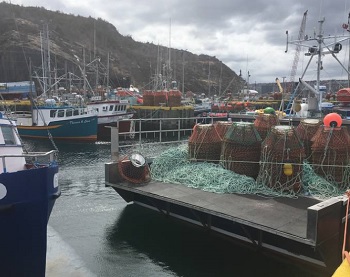
Coronavirus: A fisherman’s daughter’s perspective
I am a fisherman’s daughter who is very aware of the beauty and the dangers of the ocean. Fishing isn’t for everyone — it is a physical, dangerous, high-risk profession in which generations of fishers have gone out on the water and, all too often, not come home. The fishery is one of Newfoundland and Labrador’s many highly dependent resource sectors employing thousands of people directly and indirectly. This year the obstacles facing this sector are beyond what any industry should have to deal with on their own. Since mid-March, fish harvesters were deeply concerned about the potential impact of COVID-19. Safety was and continues to be top priority as it is impossible to social distance while working in a fishing boat. Meagan Careen, St. Bride’s>click to read< 17:12
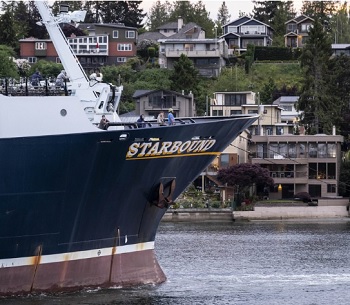
Trawl fishing in the age of the coronavirus: First, you make it through quarantine
Hundreds of crew members went through two weeks of shore-side quarantine coupled with testing for the novel coronavirus that did identify a few who, if they had gone out to sea, risked sickness and spreading the virus. “There’s no silver bullet. But this is a huge deal,” said Karl Bratvold, a managing partner of Aleutian Spray Fisheries, which operates the catcher-processor vessel Starbound now harvesting whiting in open waters off the Olympic Peninsula. “We have a steady crew. And I’m glad they came back. They work in tight quarters and it’s scary out there. We had to do what we had to do to keep these people safe.” photos, >click to read< 13:27






